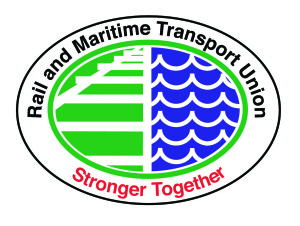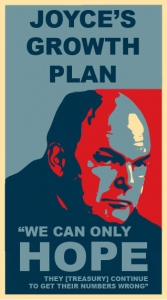Listening to the debate over NZ Aluminium Smelters in Southland made me wonder why the government is prepared to stand up for some parts of the economy but not others.
It seems Hobbits and aluminium are in, but rail engineering is definitely out.
Additionally we have recent statements from Steven Joyce on government procurement who wants New Zealand firms consulted before tender documents are prepared while government is taking a ‘whole of life’ analysis of procurement.
I suppose it’s better late than never. By wearing his economic development minister’s hat, Joyce has finally realised there are plenty of benefits in using government procurement as a lever in the economy.
He certainly didn’t seem to hold this view when he was transport minister.
My union represents rail workers. Nearly a hundred of them lost their jobs from Hillside workshops in Dunedin last year because of a lack of work – driven largely by the attitudes of Joyce and Co that the cheapest price possible should be the driving force for procurement.
We said at the time that the business case for building our trains at home went well past the jobs of Dunedin (and Lower Hutt) workers, but extended to a significant contribution to GDP and the wider engineering cluster industry in and around Hillside.
KiwiRail is owned by New Zealanders and they needed a much stronger steer from their shareholding ministers to back Kiwi jobs and industry, rather than go for the cheapest option, whatever the cost down the line.
They didn’t get that steer. Joyce refused to step in as the shareholding minister and advise KiwiRail to take a ‘whole of life’ analysis with building Auckland’s trains.
Instead they opted for the cheapest products available. They didn’t even make a bid for the electrification of Auckland’s trains or the flat top wagons, and the country lost nearly 100 Dunedin workers. Since then KiwiRail has sold Hillside with the loss of the remaining 143 jobs.
Fast forward to this year, when Joyce announced tentative steps by the government to update its procurement policy to favour local firms.
This is a start, but it’s nowhere near what our competitors are doing.
The Australian government requires contract tenderers to implement Australian Industry Participation Plans for projects over $20 million. These set out much more detail about how local firms can contribute to government contracts. I’d like to think we were moving in this direction too and, yes, I remain hopeful.







There is apparently ‘free market economics’, ‘protectionist economics’ and the type of ecomomic policy adopted by this government which can best be described as ‘Ideological Pick’n’Mix’.
If an industry needs protecting to preserve some other ideological pursuit (with the Hobbit, it was labour market reform, with Rio Tinto its the asset sales programme) it will be protected but it has scant to do with protecting jobs or even real businesses. IF they were serious about that, even as free-marketeers, they’d look at exchange rate mechanism reform.
“Exchange rate mechanism reform” – What is that exactly? Do you mean exchange controls?
Heartbreakingly true.
New Zealand as a whole seems to struggle with one of the most basic facts of good economics – there’s a difference between the cheapest price and the best value for money. The option that is the best value for money is often not that much more than the cheapest, but they always go for the cheapest as if this is the most sophisticated, smartest choice you can make. Once all the flow on costs are added up (such as stuff ups) the cheapest option often ends up being the most expensive. After nearly 30 years of this, maybe someone is finally waking up to the fact. I hope so.
I came to the conclusion a while back that NZers have become cheap and nasty and it is this that is producing the growing poverty that we’ve been seeing over the last three decades. It is time to recognise the real added costs being cheap brings and start to pay the full price and thus decrease the cost.
This article is a good reason why commercial enterprises shouldn’t be owned by the state.
I want a good return on investment from my commercial assets, not a glorified job making scheme.
Not all assets should be commercial and the returns should be measured in how well they serve the community.
Then these asset should be specified as non commercial assets and should be restricted from competing directly with other commercial enterprises for business.
I am more than happy for a left wing party to propose that idea. None of them will likely do it though as it would be difficult to sell electorally.
And that is what they were and then we got the 4th Labour government who thought that they knew better and that everything should be commercialised. The result is that we’ve become worse off.
Goodoh. Which party of the left is going to decommercialise these SOE’s?
It isn’t Labour or Green’s. I don’t think Mana has explicitly stated this either. Why not do you think?
I tried to investigate what the difference in price would have been if the trains were made in New Zealand or in China? How much did Joyce save us in dollars only? Was Hillside asked to put a bid in?
Do you have evidence Joyce was directly involved ibid the decision on where the trains would be purchased from? I thought this was made by Kiwi Rail management.
If you believe that Gosman you will believe anything. SOE’s do as their told and the political handwringing denying accountability by politicians to their ministries on “operation” grounds is based on convenience rather than fact.
I do not believe Kiwiland got the ‘cheapest price’ by flogging off the contract overseas. A local cost analysis (prepared I think for the previous Government in about 2008) argued that in order for the oversea contract in respect of rolling stock to be worthwhile for the New Zealand Economy, the price would have to be roughly 40% below what might be charged in New Zealand. And that did not take into account the likely superior quality of the home built product.
The reason was that a good proportion of the raw materials could be obtained here; the labour, design and engineering resources were local and would have meant jobs and income and hence local spending power. All these would have benefited New Zealand’s rather than some foreign economy. Only an over-zealous globalist could have ignored the advice of a detailed, well-researched and persuasively analysed argument (I’ve read the whole thing, though it was some time back). Or maybe one too steeped in a Cargo Cult mentality such as exhibited in the Steven Joyce poster supra)
New Zealand certainly still had the expertise at the time (somewhat to my surprise). Whether that expertise will remain given this and the previous administration’s poor grasp of ordinary common or garden ‘economy’ (as distinct from Neo-Classical Economics a.k.a. Chicago School Crack-pottery) is doubtful.
In answer to GOSMAN’s question; there is no doubt that the Government would have had to be consulted at the very least over the decision. After all, the purchase price would still have had to come from the public purse.
I think some of us are apt to forget. The previous private sector owners were milking the asset for all it was worth, with scarcely any kind of re-investment worth a damn.
There is plenty of doubt that the decision was Stephen Joyce’s. It would be easy to clarify if he did involve himself in the decision though. Why doesn’t one of you lefties do some actual journalistic digging and get this evidence?
Putting the economy first means that you have to align economic progression with the Clark and Fourastie three (now four) sector hypothesis; http://procureinsights.wordpress.com/2009/09/06/buy-american-establishing-artifical-boundaries-or-removing-unwanted-barriers/
Comments are closed.